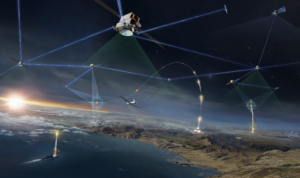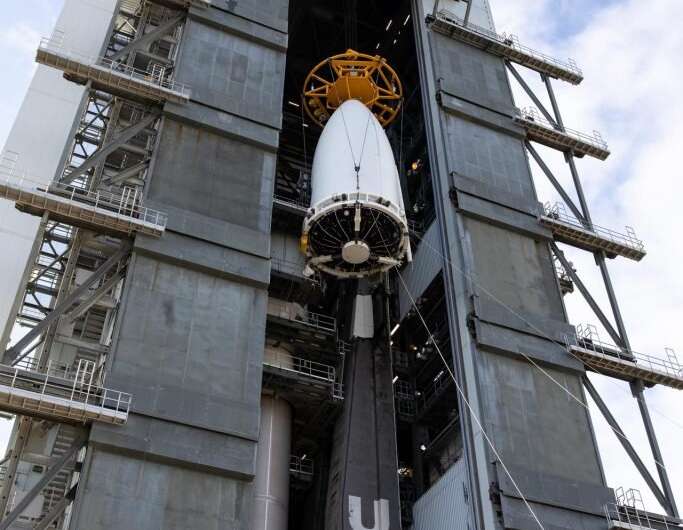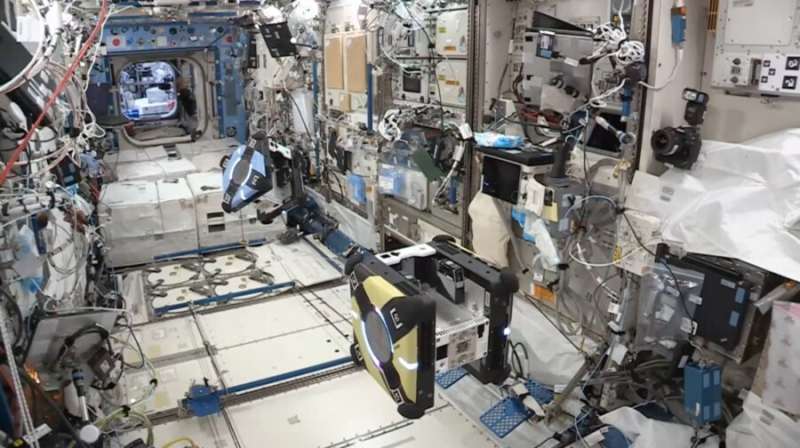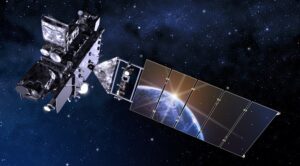Lockheed Martin, Northrop Grumman, York Space selected to build DoD’s internet-in-space constellation
Monday, 28 February 2022 15:12
The Space Development Agency announced Feb. 28 it awarded Lockheed Martin, Northrop Grumman and York Space Systems contracts worth nearly $1.8 billion to produce 126 satellites for a global communications network in low Earth orbit.
ULA Atlas V rocket topped off with NOAA's GOES-T satellite
Monday, 28 February 2022 14:10
The National Oceanic and Atmospheric Administration's (NOAA) Geostationary Operational Environmental Satellite-T (GOES-T) satellite now officially has its ride.
GOES-T was transported from Astrotech's Space Operations facility in Titusville, Florida, to United Launch Alliance's (ULA) nearby Vertical Integration Facility at Cape Canaveral Space Force Station's Space Launch Complex 41. It was then mated to the top of the Atlas V 541 rocket, which will carry it into space.
ISS experiments to find solutions for cleaning up orbital debris and repairing damaged satellites
Monday, 28 February 2022 12:16
In 2002, the European Space Agency launched Envisat, the largest civilian satellite (at the time) to go to low Earth orbit (LEO).
ESA statement regarding cooperation with Russia following a meeting with Member States on 28 February 2022
Monday, 28 February 2022 11:56Press Release N° 6–2022
We deplore the human casualties and tragic consequences of the war in Ukraine. We are giving absolute priority to taking proper decisions, not only for the sake of our workforce involved in the programmes, but in full respect of our European values, which have always fundamentally shaped our approach to international cooperation.
GOES-T nears launch as NASA plans studies of next-generation weather satellite
Monday, 28 February 2022 11:12
The latest in a series of geostationary weather satellites is ready for launch as NASA takes the next step in plans for a next generation of such spacecraft.
The post GOES-T nears launch as NASA plans studies of next-generation weather satellite appeared first on SpaceNews.
Keeping it fluid(ics) | Cosmic Kiss 360°
Monday, 28 February 2022 08:00 Video:
00:02:58
Video:
00:02:58
Europe’s Columbus laboratory is a hive of activity in this 360° timelapse as ESA astronaut Matthias Maurer works on an experiment called Fluidics and his NASA colleague Raja Chari carries out activity in the Veggie plant habitat.
Developed by French space agency CNES and co-funded by Airbus, the Fluidics experiment investigates how liquids behave in space. It was first run by ESA astronaut Thomas Pesquet in 2017 during his Proxima mission.
Made up of six small, transparent spheres housed in the black centrifuge seen here, the experiment studies two phenomena. The first is ‘sloshing’ or how liquids move in
Satellite imaging companies increase profile as they track Russia’s invasion of Ukraine
Sunday, 27 February 2022 23:00
The conflict in Ukraine has showcased the capabilities of commercial geospatial companies whose high-resolution satellite images have been ubiquitous for the past several weeks.
The post Satellite imaging companies increase profile as they track Russia’s invasion of Ukraine appeared first on SpaceNews.
Commercial spy satellites put Russia’s Ukraine invasion in the public eye
Sunday, 27 February 2022 23:00
Images collected by commercial satellites have chronicled the buildup of Russian forces on Ukraine’s borders and the ongoing invasion, providing intelligence previously only available from government sources — and seldom released to the public.
China launches national record 22 satellites on Long March 8 commercial rideshare
Sunday, 27 February 2022 13:44
China’s second Long March 8 rocket launched late Saturday carrying a domestic record 22 satellites for a range of commercial Chinese space companies.
Advanced Air Mobility for Healthcare
Sunday, 27 February 2022 09:04 During the global pandemic people have realized remote healthcare, delivery, and easy access to services are paramount. NASA's Advanced Air Mobility or AAM mission paves the way toward enabling significant air mobility needs such as better access to healthcare services.
AAM has the potential to provide medical transport for people and supplies around the world. This could be a highly autom
During the global pandemic people have realized remote healthcare, delivery, and easy access to services are paramount. NASA's Advanced Air Mobility or AAM mission paves the way toward enabling significant air mobility needs such as better access to healthcare services.
AAM has the potential to provide medical transport for people and supplies around the world. This could be a highly autom NASA supports research to advance earth science
Sunday, 27 February 2022 09:04 Through a new prize competition, NASA is engaging minority serving institutions (MSIs) to bring ideas for new information technologies that will help address climate change. The prize competition, the MSI Space Accelerator, comes from a new partnership between NASA's Science Mission Directorate, the Minority University Research Education Project within the Office of STEM Engagement, NASA's Jet P
Through a new prize competition, NASA is engaging minority serving institutions (MSIs) to bring ideas for new information technologies that will help address climate change. The prize competition, the MSI Space Accelerator, comes from a new partnership between NASA's Science Mission Directorate, the Minority University Research Education Project within the Office of STEM Engagement, NASA's Jet P NASA develops technology to dissect the lower atmosphere
Sunday, 27 February 2022 09:04 The part of the atmosphere closest to the planet is the hardest to measure from space due to the volume of gases above it. Studying Earth's planetary boundary layer, or PBL, will enable scientists to better understand the interaction between Earth's surface and weather and how that evolves in a global, changing climate.
"The planetary boundary layer is where we live and where we experience
The part of the atmosphere closest to the planet is the hardest to measure from space due to the volume of gases above it. Studying Earth's planetary boundary layer, or PBL, will enable scientists to better understand the interaction between Earth's surface and weather and how that evolves in a global, changing climate.
"The planetary boundary layer is where we live and where we experience Satellite laser altimetry helps monitor changes in global lake water storage
Sunday, 27 February 2022 09:04 As the main freshwater resource on Earth's surface, lakes play an important role in maintaining ecosystem stability and the sustainable development of human society.
However, it's been difficult to evaluate changes in global lake-water volume across space and time due to data problems. Specifically, ground-monitoring data have not been sufficiently representative of all lakes, and traditio
As the main freshwater resource on Earth's surface, lakes play an important role in maintaining ecosystem stability and the sustainable development of human society.
However, it's been difficult to evaluate changes in global lake-water volume across space and time due to data problems. Specifically, ground-monitoring data have not been sufficiently representative of all lakes, and traditio Tuning in to invisible waves on the JET tokamak
Sunday, 27 February 2022 09:04 Research scientist Alex Tinguely is readjusting to Cambridge and Boston. As a postdoc with the Plasma Science and Fusion Center (PSFC), the MIT graduate spent the last two years in Oxford, England, a city he recalls can be traversed entirely "in the time it takes to walk from MIT to Harvard."
With its ancient stone walls, cathedrals, cobblestone streets, and winding paths, that small city
Research scientist Alex Tinguely is readjusting to Cambridge and Boston. As a postdoc with the Plasma Science and Fusion Center (PSFC), the MIT graduate spent the last two years in Oxford, England, a city he recalls can be traversed entirely "in the time it takes to walk from MIT to Harvard."
With its ancient stone walls, cathedrals, cobblestone streets, and winding paths, that small city Russian invasion of Ukraine and resulting US sanctions threaten future of ISS
Sunday, 27 February 2022 02:27 New U.S. sanctions on Russia will encompass Russia's space agency, Roscosmos, according to a speech U.S. President Joe Biden gave on Feb. 24, 2022.
In response to these sanctions, the head of Roscosmos on the same day posted a tweet saying, among other things, "If you block cooperation with us, who will save the ISS from an uncontrolled deorbit and fall into the United States or Europe?"
New U.S. sanctions on Russia will encompass Russia's space agency, Roscosmos, according to a speech U.S. President Joe Biden gave on Feb. 24, 2022.
In response to these sanctions, the head of Roscosmos on the same day posted a tweet saying, among other things, "If you block cooperation with us, who will save the ISS from an uncontrolled deorbit and fall into the United States or Europe?" 
